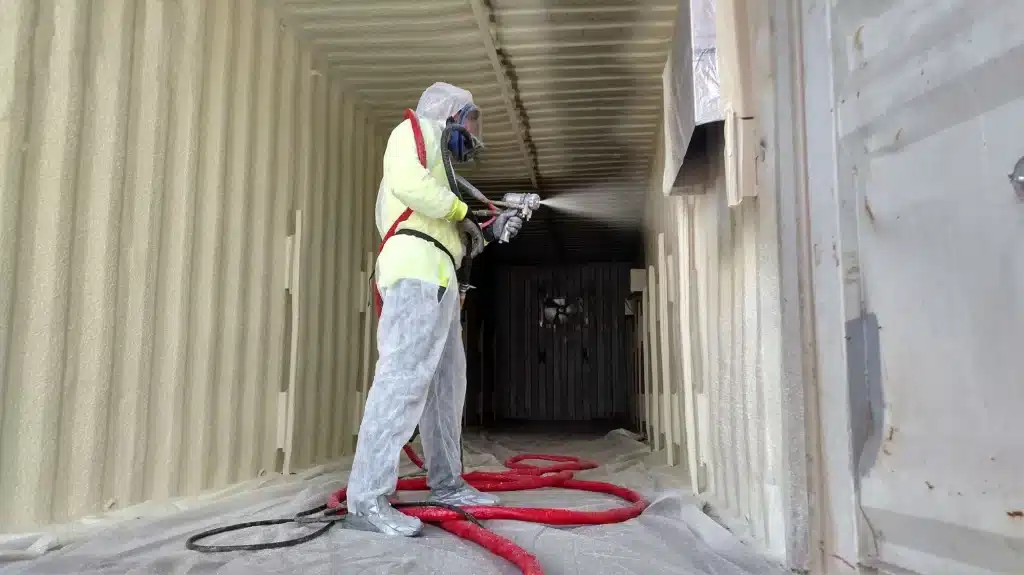
Understanding Spray Foam Insulation and Its Noise Reduction Capabilities
In today’s world, noise pollution has become a significant concern, affecting our quality of life and well-being. At Spray Foam Genius Marketing, we are dedicated to helping spray foam insulation contractors enhance their online visibility and reach. One of the standout benefits of spray foam insulation is its ability to mitigate noise pollution. In this comprehensive guide, we will explore how spray foam insulation can effectively reduce noise, offering a quieter and more comfortable environment for both residential and commercial spaces.
What Is Spray Foam Insulation?
Spray foam insulation is a versatile and modern material designed to improve thermal insulation and energy efficiency. It is composed of two primary chemicals: isocyanate and polyol resin. When these chemicals are mixed, they expand and form a foam that adheres to surfaces and fills gaps. This foam can be applied to walls, ceilings, floors, and other areas where insulation is needed. There are two main types of spray foam insulation:
Open-Cell Foam
Open-cell spray foam is characterized by its lower density and flexible nature. It is known for its excellent air-sealing properties and sound absorption capabilities. This type of foam has a softer texture, which helps to reduce the transmission of airborne noise. However, its soundproofing performance is not as robust as closed-cell foam.
Closed-Cell Foam
Closed-cell spray foam is denser and more rigid compared to open-cell foam. It features closed cells that do not allow air or moisture to penetrate, making it highly effective for both thermal insulation and soundproofing. The higher density of closed-cell foam contributes to its superior ability to block and absorb sound, making it the preferred choice for noise-reduction applications.
Why Noise Pollution Matters
Noise pollution is not just an inconvenience; it can have serious implications for health and well-being. Chronic exposure to high noise levels can lead to:
- Stress: Constant exposure to loud noises can elevate stress levels, leading to anxiety and other health issues.
- Hearing Loss: Prolonged exposure to loud environments can damage hearing and result in permanent hearing loss.
- Sleep Disturbances: Noise pollution can interfere with sleep patterns, leading to sleep disorders and overall poor health.
- Cardiovascular Problems: Studies have linked long-term noise exposure to an increased risk of heart disease and high blood pressure.
In both residential and commercial settings, managing noise pollution is crucial for maintaining a healthy and comfortable environment. Spray foam insulation offers an effective solution to mitigate these issues by enhancing soundproofing and creating a quieter space.
How Spray Foam Insulation Helps Reduce Noise Pollution

High Density for Superior Soundproofing
One of the primary advantages of closed-cell spray foam insulation is its high density. The denser structure of closed-cell foam acts as a barrier to sound waves, preventing them from passing through walls, ceilings, and floors. This makes it highly effective at reducing noise from external sources, such as traffic or construction, as well as minimizing noise transmission between rooms.
Closed-cell foam’s superior soundproofing capabilities are due to its ability to absorb and deflect sound waves. By creating a solid and continuous layer of insulation, closed-cell foam reduces the amount of sound that can penetrate through building materials, resulting in a quieter indoor environment.
Sealing Gaps and Air Leaks
Spray foam insulation excels at sealing gaps and air leaks, which is essential for effective soundproofing. Traditional insulation materials, such as fiberglass or cellulose, may leave small gaps and voids where sound can travel through. Spray foam, on the other hand, expands upon application, filling these gaps and creating an airtight seal.
This airtight seal not only improves energy efficiency by preventing heat loss but also enhances acoustic performance by minimizing sound leakage. By addressing these small openings, spray foam insulation helps to create a more soundproof environment, reducing unwanted noise from outside and between rooms.
Reduction of Echo and Reverberation
Echo and reverberation can significantly impact the acoustics of a space. Hard surfaces, such as concrete walls and wooden floors, can cause sound waves to bounce around, leading to unwanted echoes and prolonged reverberation. Spray foam insulation can help manage these acoustic issues by covering surfaces and filling voids that contribute to sound reflections.
The foam’s ability to absorb sound waves reduces the intensity of echoes and reverberations, creating a more controlled acoustic environment. This is particularly beneficial in spaces where clear communication is essential, such as offices, conference rooms, or recording studios.
Enhanced Privacy
Privacy is a major concern for both residential and commercial properties. In multi-family buildings or shared spaces, noise from neighbors or street traffic can be a significant disturbance. Spray foam insulation helps to maintain privacy by minimizing the transfer of sound between rooms and from external sources.
By installing spray foam insulation in walls, ceilings, and floors, you can effectively reduce the amount of noise that travels through shared walls or floors. This enhances privacy and creates a more peaceful and comfortable living or working environment.
Durability and Long-Term Performance
Spray foam insulation is renowned for its durability and long-term performance. Unlike traditional insulation materials that may settle or degrade over time, spray foam maintains its shape and effectiveness. This longevity ensures that the soundproofing benefits of the insulation continue to provide value throughout its lifespan.
The resilience of spray foam insulation means that it can withstand various environmental conditions without compromising its acoustic performance. This makes it a reliable choice for long-term noise reduction and overall property comfort.
Comparing Spray Foam Insulation to Other Soundproofing Methods
While spray foam insulation offers significant benefits for noise reduction, it’s important to compare it with other soundproofing methods to understand its advantages better.
Fiberglass Insulation
Fiberglass insulation is a common alternative to spray foam. It provides some level of soundproofing but is generally less effective than spray foam. Fiberglass insulation can settle over time, reducing its insulating properties and soundproofing capabilities. Additionally, it does not seal gaps as effectively as spray foam, allowing more sound to pass through.
Acoustic Panels
Acoustic panels are designed to absorb sound and reduce echo within a room. While they are effective for controlling sound within a space, they do not address sound transmission through walls and ceilings. Spray foam insulation provides a more comprehensive solution by addressing both sound absorption and soundproofing, making it a better choice for reducing noise pollution in various settings.
Mass-Loaded Vinyl
Mass-loaded vinyl is another option for soundproofing. It is a dense material that can be installed on walls and floors to block sound. While it is effective at reducing noise transmission, it does not offer the same level of insulation as spray foam and may require additional materials to achieve similar results. Spray foam’s dual benefits of thermal insulation and soundproofing make it a more versatile and efficient solution.
Implementing Spray Foam Insulation in Your Property
Consult a Professional
To achieve the best results with spray foam insulation, it’s essential to work with a professional contractor who specializes in this type of insulation. A qualified contractor can assess your property’s specific needs, recommend the appropriate type of foam, and ensure proper application. They will have the expertise to address any challenges and ensure that the insulation performs optimally for both energy efficiency and noise reduction.
Prepare the Space
Before installing spray foam insulation, proper preparation is crucial. This may involve removing existing insulation, cleaning surfaces, and addressing any structural issues. Ensuring that the area is prepared adequately allows the spray foam to adhere correctly and provides maximum soundproofing benefits.
Regular Maintenance
Although spray foam insulation is durable, regular maintenance is essential to ensure that it remains in good condition. Inspect the insulation periodically for any signs of damage or wear and address any issues promptly. Maintaining the insulation helps to preserve its acoustic performance and extend its lifespan.
Consider Additional Measures
For enhanced soundproofing, consider combining spray foam insulation with other soundproofing techniques. Acoustic panels, heavy curtains, or soundproof doors can complement the benefits of spray foam and provide a more comprehensive noise reduction solution. This layered approach can create a quieter and more comfortable environment.
Enhance Your Property’s Comfort with Spray Foam Insulation
Spray foam insulation is a powerful solution for reducing noise pollution, offering numerous benefits for both residential and commercial properties. Its high density, gap-sealing capabilities, and long-lasting performance make it an excellent choice for creating a quieter and more comfortable environment.
If you’re ready to experience the advantages of spray foam insulation, contact us at 877-840-FOAM for USA and 844-741-FOAM for Canada visit our website at sprayfoamgeniusmarketing.com, or email us at [email protected] to get started.
Let us help you enhance your property’s comfort and reduce noise pollution with top-notch spray foam insulation solutions.
- Social Media Marketing for Spray Foam Businesses: What Works in 2025? - February 6, 2025
- Best SEO Strategies for Spray Foam Insulation Contractors to Rank #1 on Google - February 6, 2025
- What is Spray Foam Insulation? Benefits and Applications - February 5, 2025

